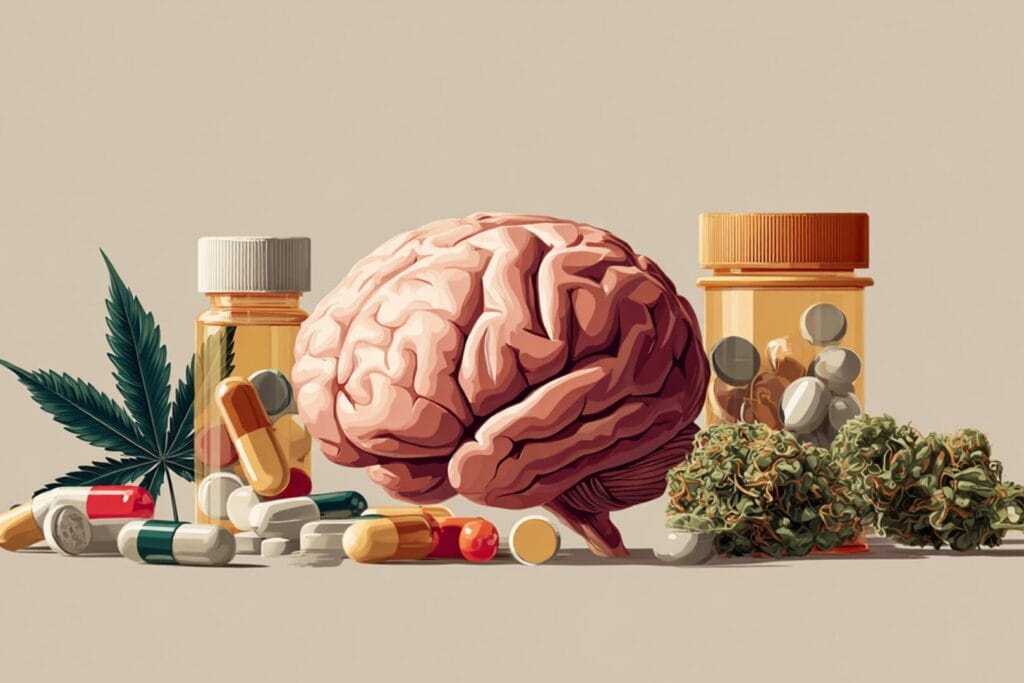Types of Therapies in Addiction Programs
Addiction is a complex disease with a substantial impact on anyone experiencing its effects. Sufferers experience significant reductions in their quality of life, from increased stress to financial instability. Due to the innumerable different types of harm substance use disorders and addiction can have on a person, many of the most effective addiction programs leverage a multitude of different therapy types to help patients most effectively treat their addictions.
What Can Various Therapies Accomplish?
Through learning valuable coping skills, developing and maintaining sustainable routines, and increasing emotional awareness, addiction treatment programs can help clients to begin recovery and reduce the likelihood of relapse after program completion.
The types of therapies utilized by specific addiction treatment programs will determine whether one program or another is best suited to a specific individual’s needs. In this article we will break down the different types of therapies and addiction programs commonly offered so that you can know what to expect if you or someone you care about is considering signing up for addiction treatment.
The Importance of Substance Use Treatment
Understanding Addiction
In order to best be an advocate for yourself of a loved one struggling with addiction, it is important to establish a strong foundation of knowledge about the disease and its potential repercussions.
What Is Addiction?
Addiction is a chronic condition in which a person may feel reliant upon substance use. Addiction occurs when the brain is inordinately weighted toward disproportionately rewarding specific behaviors or substances more than others.1
Over time, addiction can result in substance abuse, behavioral disorders and dysfunctions, and other long-term problems.
What Are the Causes and Risk Factors of Addiction?
Addiction can be caused by a variety of factors. Some people, for example, are more susceptible to physiological addictions because of genetic factors. Major life events and stressors can also cause addictions. Some of the most common causes and risk factors of addiction include:
- Job Loss
- Deaths of close family/friends
- Genetic factors
- Repeated exposure to stressful situations
Addiction risk factors may come from internal sources, like genetic factors. Other factors may be external, like a person’s environment. Regardless of the cause of a person’s addiction, all individuals suffering from addiction can benefit from treatment and support.
What is the Importance of Therapy in Addiction Programs?
Therapy is one of the best tools to help individuals overcome addiction and engage fully with rehabilitation processes. Addiction programs often incorporate at least one type of therapy into their treatment structure.
Therapy is important because it allows addiction programs to:
- Help individuals psychologically recover from the chemical effects of addiction.
- Provide individuals with the tools they need to avoid relapse in the future.
- Give individuals access to support networks to build and maintain healthy habits.
Types of Outpatient Addiction Treatment Programs
There are various types of outpatient addiction treatment programs. In order to decipher between them and determine which could be most beneficial to you, they will be detailed below.
Outpatient Rehabilitation
In outpatient programs, patients may visit treatment facilities or be visited by addiction professionals at their homes. A benefit of outpatient treatment is that it may allow patients to stay at home, maintain employment, and engage in otherwise normal daily routines.
Outpatient programs will require clients to regularly check-in with members of their treatment team and communicate frequently with treatment centers to ensure they are able to maintain healthy habits. Outpatient rehab programs can be advantageous for treatment patients who cannot afford to take time off work for an inpatient program or are responsible for taking care of another person.
Sober Living Programs
Sober living programs take place in group living residences. Also called halfway houses, sober living homes are intended for individuals recovering from addiction. All residents in sober living homes agree to remain sober and residents are expected to form strong support networks with each other.
Sober living programs can be beneficial due to the complex nature of addiction. Sober living homes allow patients to rebuild their lives, go to work, and attend social events with others while continuing their addiction recovery. Sober living programs can enjoy some of the benefits of both inpatient and outpatient programs by allowing patients high levels of flexibility and freedom, with more support and involvement than outpatient treatment options.
Types of In-Patient Addiction Treatment Programs
There are many types of addiction treatment programs available. Some types of addiction treatment programs are meant to be used earlier or later in the treatment process. Other types of addiction treatments differ in the approach they take in treating addiction.
Medical Detoxification
Medical detoxification focuses on treating physiological aspects of stopping substance use. In cases where the body has become dependent on a substance, detoxification can cause a series of profound physiological changes, and cause withdrawal symptoms
Medical detoxification often includes ceasing substance use, supplementing hydration, and administering stabilizing agents to manage withdrawal symptoms. Without appropriate medical supervision detoxification can be a risky process.
Medical detoxification programs alone do not always address the underlying causes of addiction. Therefore, patients may need to pursue other forms of addiction treatment or therapy after undergoing detoxification.
Inpatient/Residential Rehabilitation
Inpatient rehabilitation centers are a commonly utilized resource in addiction treatment programs. Individuals may stay at residential treatment centers for all, or a portion, of their treatment. At inpatient or residential rehab centers, individuals can:
- Get the care and support they need from medical professionals or family members
- Have supervision for some or all of the time
- Undergo therapy trained professionals
Inpatient or residential rehabilitation can also be useful for individuals who have difficulty remaining sober after getting treatment. Inpatient rehabilitation can be the best type of addiction treatment program for those worried about relapsing or self-harm.
Behavioral Therapy in Addiction Treatment Programs
Addiction treatment programs often use different therapeutic techniques to assist their patients’ recovery. Among all possible therapy types, Cognitive Behavioral Therapy and Dialectical Behavioral Therapy are utilized most often. These two types of therapy both work under the belief in a person’s ability to intentionally change their thought patterns and subsequent behaviors.
Therapy can take on a variety of forms, with each kind being best suited toward addressing specific problems. In individual therapy sessions, patients and therapists are able to spend extended amounts of time focused on understanding the patient, their symptoms, and the kinds of treatments they are most likely to respond well to.
Benefits of Group Therapy
In group therapy, patients have the dual benefit of professional guidance from therapists leading groups, and peer support. In group therapy, patients have the unique opportunity to see how others address problems and symptoms similar to their own from an outside perspective. Group therapy can also allow therapists to better understand how their patient navigates peer relationships and may use this knowledge to inform their treatment.
What is Group Therapy?
Cognitive Behavioral Therapy
Cognitive behavioral therapy (CBT) is an effective therapy type many types of addictions and associated symptoms, including depression, substance abuse, anxiety, eating disorders, among others.2
Principles of CBT
Cognitive behavioral therapy works based on the principles that:
- Psychological problems are based, in part, on the ways we think about things.
- Psychological problems are, in part, based on behaviors or learned patterns of behavior.
- Individuals suffering from psychological issues can learn new ways to deal with problems to treat their symptoms.
Focuses of CBT
Cognitive behavioral therapy focuses on changing individuals’ thinking patterns and by leveraging strategies like:
- Teaching patients problem-solving skills.
- Teaching patients to better understand what motivates theirs and others’ behavior.
- Teaching patients to recognize distortions in their thinking.
- Helping patients develop better confidence and acknowledgement of their own capabilities.
- Helping patients to address conflict healthily and without avoidance.
- Teaching patients relaxation and calming techniques.
Cognitive behavioral therapy emphasizes teaching individuals how to regulate themselves and to build tools to avoid future relapses.
Holistic Therapies for Addiction
Many of the best addiction treatment programs leverage holistic therapies to assist individuals emotionally and physically. Holistic therapies focus on overall wellness for individuals, rather than targeting addiction-specific symptoms or causes.
Meditation Therapy
Meditation therapy can be very helpful for teaching individuals how to self-soothe and find peace, even in the midst of stressful circumstances. This may assist individuals struggling with addiction by allowing them to cope with stress without turning to substance use or damaging behaviors.
Yoga Therapy
Yoga therapy teaches patients to regulate their mood and psychological state through the practice of yoga. Patients learn how to use yoga to relieve stress, improve their bodily wellness, and center themselves during stressful times.
The Connection Between Yoga and Mental Health
Massage Therapy
Massage therapy can allow individuals suffering from addiction to experience relief from physical pain, increased bodily awareness, physical relaxation, and more positive mental states.
Experiential Therapy
Experiential therapy allows patients to use different expressive tools or activities, like painting or music playing, to recreate situations from their past. Experiential therapy helps patients address uncomfortable emotions in supportive environments, and to release negative feelings associated with painful memories.
Exercise
Physical exercise often forms the backbone of addiction treatment programs as an outlet for releasing built up stress hormones, like cortisol, regulating neurotransmitter levels, and boosting mood through the release of endorphins, which reduce pain and can have a euphoric effect.
Dialectical Behavior Therapy
Dialectical behavior therapy (DBT) is a specific variation of CBT. Dialectical behavior therapy focuses on teaching individuals to live in the moment, improve their relationships, and to cope with stress through emotional regulation.3
Treatment via DBT
DBT was created to assist individuals with Borderline Personality Disorder. Its use has been expanded, and is commonly used in addiction treatment. Dialectical behavior therapy uses variety of techniques for its goals, including:
- Individual therapy sessions, where patients’ learned skills are analyzed, then adapted to most effectively address challenges.
- Group therapy sessions, where patients are taught positive behavioral skills.
- Phone coaching sessions in which patients may call therapists outside of regular sessions for supplemental guidance or support.
What do DBT Develop?
To ensure treatment effectiveness, dialectical behavior therapy focuses on developing:
- Mindfulness
- Distress tolerance, to allow patients to accept current stressors or challenges, and find healthy ways to address them
- Interpersonal effectiveness, to help individuals become more assertive in relationships
Other Types of Therapies in Addiction Programs
Addiction treatment programs may offer other types of therapies as well. These therapies may be practiced in conjunction with the aforementioned traditional and holistic therapies.
12-Step Facilitation Therapy for Addiction
12-step facilitation therapy is a type of active engagement strategy meant to help individuals become actively involved in support groups based on the Twelve Steps method. These support groups can be especially beneficial for those without substantial support from friends or family members.
Family Therapy for Addiction
In family therapy, a licensed therapist guides group therapy sessions with individuals and their family members. Family members provide important emotional and structural support in addiction treatment so their involvement in therapy can help them assist individuals in their recovery.
Motivational Interviewing for Addiction
Motivational interviewing is a counseling approach to help individuals develop motivation to quit substance abuse. It acknowledges the fact that motivation for addiction recovery may only come from within clients.
Additional Therapy Approaches for Addiction
Matrix Model for Addiction
The Matrix Model for Addiction is traditionally structured as 16-week-long intensive treatments aimed to engage persons who misuse stimulants in treatment programs to achieve long-term abstinence. In these therapy programs, patients learn about addiction and relapse, and receive important support and direction from licensed therapists.
Eye Movement Desensitization and Reprocessing (EMDR) Therapy
EMDR is a treatment designed to address trauma symptoms through the intentional recall and reprocessing of traumatic experiences while engaging multiple parts of the brain simultaneously. Through EMDR therapy, patients may overcome symptoms of PTSD or related disorders, and be able to better manage their addiction.4
Other Types of Therapies for Addiction
Aside from these therapy types, addiction treatment programs may leverage other therapies, such as:
- Rational emotive behavior therapy (REBT): This approach helps patients to identify and then replace destructive thoughts and convictions with more proportionate and healthy responses.
- Contingency management therapy: This therapy style can help individuals treat their substance abuse disorders by utilizing material wants to motivate desirable behaviors.
Find Therapies for Addiction Treatment at San Diego Detox
It can be very difficult to overcome the symptoms of addiction alone and there is no need to go through this process alone.
Get help from the addiction treatment team here at San Diego Detox. As a licensed addiction treatment center, we offer several addiction treatment programs for all kinds of individuals struggling with addiction. Our treatment options include:
Yoga therapy teaches patients to regulate their mood and psychological state through the practice of yoga. Patients learn how to use yoga to relieve stress, improve their bodily wellness, and center themselves during stressful times.
- Medical detox to assist individuals suffering from physiological side effects of addiction or substance abuse. Medical detox often precedes other therapies and addiction treatment strategies.
- Individual and group therapies of a variety of types. With our licensed therapists assisting you, you’ll receive the necessary education and support you need to overcome addiction and maintain sobriety.
- Holistic treatment options, such as meditation, art therapy, and more. These treatment options are intended to help you bolster your entire wellbeing for a healthy mind and body.
Begin Your Recovery Journey Today
Recovery is not linear, and the path can be long.5 But you never have to walk it alone. With San Diego Detox, you can recover from addiction, maintain sobriety, and reclaim your life. Contact us today for more information.
Support Groups for Addiction Treatment
Lots of addiction treatment programs facilitate connection to support groups. Support groups are vital in inspiring individuals to maintain sobriety. Maintaining sobriety is much more achievable when it is motivated through relationships and peer connection.
Types of Support Groups for Addiction Treatment
Some of the most common support groups used by addiction treatment centers include:
Twelve-Step Programs
Twelve-step programs are an important resource for those recovering from addiction. As their name suggests, they offer program members twelve steps to achieve and maintain their sobriety. Much of their effectiveness revolves around three key ideas–acceptance, surrender, and active involvement in twelve-step meetings and activities.
Alcoholics Anonymous
Alcoholics Anonymous (AA) is a well-known recovery organization for individuals addicted to alcohol. Alcoholics Anonymous provides anonymous support and assistance to those struggling with alcohol abuse.
Narcotics Anonymous
Narcotics Anonymous is a program similar to AA that helps individuals addicted to narcotics rather than alcohol.
SMART Recovery
Smart Recovery is a global community to help individuals support one another and overcome substance abuse together. It hosts meetings on addiction to drugs, alcohol, overeating, gambling, among others. It uses a four-point program to address addiction.
Addiction counselors
Some treatment facilities bring in addiction counselors to assist in the treatment process, independent from the treatment center.
Each addiction treatment center or program is different. Some programs connect patients to a variety of support group options, while other programs may focus on one type of addiction support over others.
Resources
https://www.asam.org/quality-care/definition-of-addiction
https://www.apa.org/ptsd-guideline/patients-and-families/cognitive-behavioral
https://www.ncbi.nlm.nih.gov/pmc/articles/PMC2963469/
https://www.emdr.com/what-is-emdr/
https://nida.nih.gov/publications/drugs-brains-behavior-science-addiction/treatment-recovery






